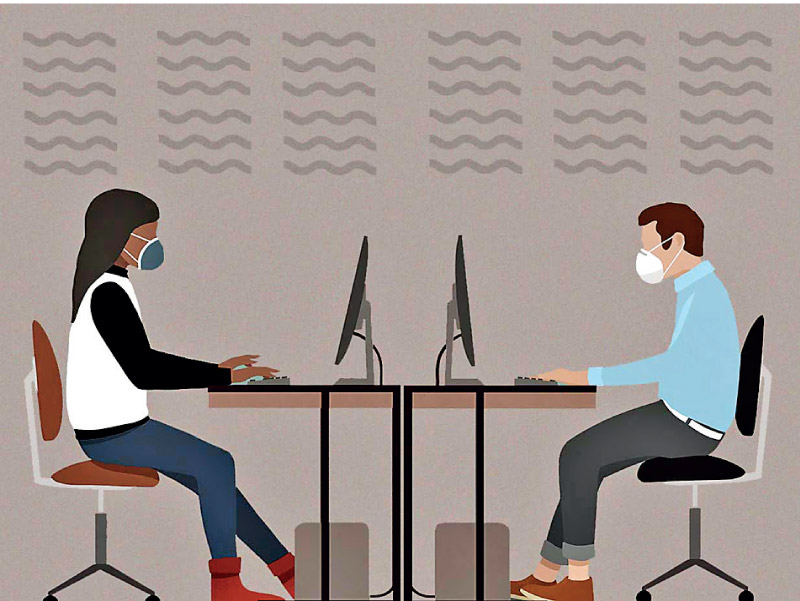Tuesday Feb 17, 2026
Tuesday Feb 17, 2026
Friday, 6 August 2021 00:00 - - {{hitsCtrl.values.hits}}

The importance of ensuring good indoor air quality has heightened with the spread of SARS COV-2 virus through air. Hence, employers must ensure that adequate precautions are taken to improve the indoor air quality at work premises
 Indoor air pollution contributes to the development of chronic lung disease, lung cancer and infections especially among the people with existing lung disease.
Indoor air pollution contributes to the development of chronic lung disease, lung cancer and infections especially among the people with existing lung disease.
The importance of ensuring good indoor air quality has heightened with the spread of SARS COV-2 virus through air. Hence, employers must ensure that adequate precautions are taken to improve the indoor air quality at work premises. This can be achieved by passive flow of fresh air through windows, doors, air vents and ducts and by mechanical air filtration systems.
Coronavirus disease (COVID-19), especially the Delta variant is spreading rapidly across the world, necessitating many countries to go into lockdown. It seems plausible that aerosols are important in transmitting the virus among communities.
Aerosol transmission occurs through inhalation of small virus particles suspended in the air after a person with the virus has been in the same enclosed area. Evidence has indicated that the SARS COV-2 remains airborne for prolonged periods, enabling rapid distribution over great distances. Therefore, aerosols may be responsible for “super spreader” events.
In certain circumstances, especially in enclosed indoor environments, two-metre distances may not be protective. The airborne virus particles can remain in enclosed indoor environments for hours, possibly increasing the virus concentration over time. With more people occupying the premises for a longer duration the risk of transmission can be greater.
Adequate ventilation reduces the amount of virus in the air, thus reducing the risk from aerosol transmission. Previously, evidence indicated that aerosols transmission was significant for Influenza A and SARS-COV-1 viruses and was associated with more severe illness.
Due to the spread of more transmissible variants such as the Delta variant, the importance of maintaining a good natural ventilation system within the enclosed environments have become significant in safeguarding the workforce.
Good ventilation systems can protect larger groups of people. Over the years, research has demonstrated the correlation between ventilation, transmission and spread of several infectious diseases. Studies have supported the theory that ventilation is an important factor in preventing airborne transmission. The number of occupants, the type of work activities, size of the enclosed space and rate of airflow are all deciding factors on the level of risk.
Fresh air supply by opening windows or through mechanical ventilation systems can reduce the concentration of the virus aerosols. High-efficiency particulate air filters (HEPA) that filter out the virus particles within the premises have demonstrated to be effective in reducing viral load in an enclosed environment.
However, air-conditioning systems which simply recirculate the existing air are not beneficial in reducing the virus circulating within the enclosed indoor premises. In such circumstances, a mix with natural ventilation is important. Direction of the airflow should be considered to prevent the spread of virus from exhaled breath of one person over to another.
When using air-conditioners, the air change rate within an enclosed environment is important. Flow rate is dependent on the size of the premises and the number of occupants. Use of ultraviolet radiation to disinfect air may be helpful. However, this method is not currently recommended by the World Health Organization probably due to unknown efficacy.
During this pandemic, workplaces use large amounts of chemical disinfectants to clean the surfaces. Aerosolised cleaning agents can pose a significant health risk to people. On most occasions’ ventilation is overlooked when using cleaning products, increasing exposure to toxic substances. Hence, precautions must be taken to well-ventilate the premises after the use of disinfectants.
Employers are consistently seeking effective methods to protect their greatest asset, employees, and ensure business continuity. Stringent control measures can be introduced in workplaces, but compliance may be deficient. Workers need to be educated on the importance of the control measures implemented at workplaces to protect them and their community. Ventilation is only one component of a larger preventive strategy which include wearing masks correctly, physical distancing, avoiding crowds, surface disinfection, hand hygiene, and personal hygiene.
(Dr. Aseni Wickramatillake is a specialist in occupational health, industrial hygiene and ergonomics. Nick Pahl is CEO, Society of Occupational Medicine, UK. They can be reached via email [email protected])